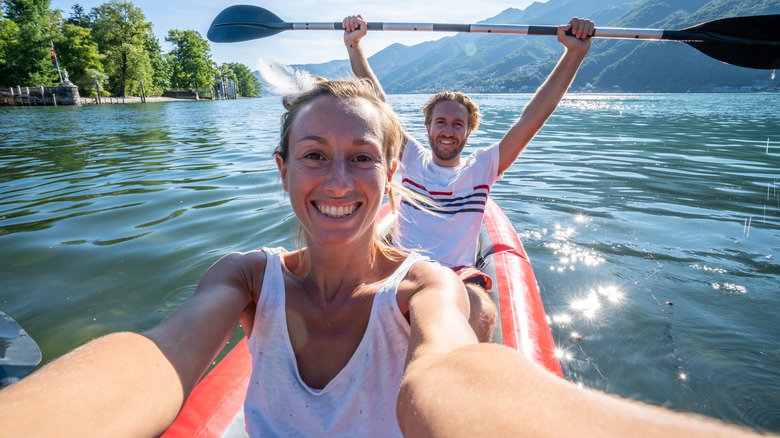How To Completely Unplug During Your Next Vacation
We live in a society that perpetuates an "always-on" culture and a "hustle" mentality. Everyone is expected to stay connected at all times, so much so that many find it difficult to unplug during vacations — the brief periods when you're supposed to be relaxing, thinking of anything else but work, and doing a digital detox.
In fact, according to a study from Glassdoor, roughly 54% of workers in the U.S. admitted to finding it difficult to step away from work even on paid time off. However, according to experts, gluing yourself to a screen during what is supposed to be a time for unwinding only does more harm than good. "Traditionally a holiday has been a chance to escape, but nowadays people are on holiday checking work emails or posting holiday snaps on social media," Dr. Brad McKenna and Dr. Wenjie Cai, pioneers in digital-free tourism, told CNN. "So in a way, they are still engaging with their work commitments back home. We believe this constant connectivity on holiday has a negative impact on well-being."
Vacations have long been documented to be the antidote to burnout, and taking them can do wonders for your mental health and productivity. But it's even more meaningful if you go tech-free, with McKenna and Cai noting that "being present" results in "more memorable travel experiences." The last thing you want is to be tethered to your phone the whole time, or worse, turn the vacation into a "workcation." To truly unplug, you have to be deliberate about it.
Set aside some time for PTO prep
While you spend a considerable amount of time plotting your summer vacation plans, from your flights and accommodations down to your modes of transportation and specific places of interest, it's also equally important to carve out some time to prepare for the days you're away. The includes both at home — making accommodations for pets or arranging a house sitter — and at work. During this allotted period, instead of simply putting up an out-of-office email and leaving the rest of your colleagues to step in on your behalf, delegating the tasks and liaising with your clients yourself may help ease your anxiety on vacation. That way, you have clearly communicated what needs to be done and have set expectations about your availability. If you wish, you can also take this time to list tasks you would need to do when you return, according to priority, so your responsibilities won't eat away at you when you're supposed to be enjoying.
In terms of unplugging, if you can't do it completely, see to it that you're setting hard limits on time spent on checking emails, and just select a few apps to retain on your phone. It may be counterintuitive, but if you really can't find it in you to relax without taking a peek at what's happening at work, squeezing in short check-ins throughout your vacation can help you have peace of mind. Just make sure that you stick to your set limit and be intentional about not going overboard.
Give active holidays a try
If you're the type to get finicky when unwinding, or if you tend to overthink things when you're trying to relax (we get it), you may want to plan a vacation that will keep your mind and body busy instead. One way to do this is by weaving in activities in your schedule that will keep you completely preoccupied and leave you unable to use your electronics or ruminate on things that will only cause anxiety. Jonny Edser, managing director of team building company Wildgoose USA, suggests planning "active holidays," a type of vacation that will get you moving.
"I like to choose active holidays so that I have a chance to switch off. We often go to the French Alps in the summer so that we are walking, biking, running, and lake swimming," he told CNBC. "Lots of activities that really help to divert attention from the brain and give you another focus. Personally, if I was lying on a beach or a pool then the temptation would be to check my messages."
This is science-backed as it turns out. Dr. David B. Posen, a stress management expert, pointed out to National Geographic that "if you are doing something that requires a certain amount of concentration, that's all your brain can do." Immersing yourself in activities that will keep your mind and body engaged, even if it's as simple as doing artwork or reading an engrossing book, can help you relax, and subsequently unplug.
Plan a getaway in a remote location
Now, if you really don't want to be tempted to reach out for your phone or laptop during your time off, you can technically force yourself to do so by spending your vacation off the grid, ideally in a remote place where there's barely cell reception or access to data. While there, you can truly escape the hustle and bustle of modern living and participate in more analog activities that don't have anything to do with electronics at all. You'll have the rare opportunity to completely unplug, all while immersing yourself in the beauty of nature.
There are various approaches to going off the grid, including going camping (or glamping, if you don't want to get your hands dirty), spending time in springs resorts, like Castle Hot Springs in Arizona which is open about having limited cell service and electronic-free areas, renting a Getaway cabin and locking your phone away in a box, or perhaps jetting off to a remote island like the Ulko-Tammio in Finland, which encourages its tourists to explore the place phone-free.
Alternatively, you can also go out of your way to fly across the world and stay in a place with a big time difference, so at least you can't be reached during normal work hours (and vice versa), and you won't be as tempted to connect with people back home since they're likely unavailable at the time.
Whatever you decide, the most important thing is to allow yourself to unwind and unplug. You know you need it.



